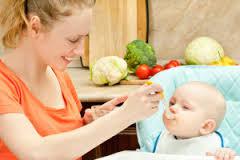
Parents may see mealtime with babies as little more than a chance for kids to toss sippy cups and yogurt puffs on the floor, but a new study suggests infants may actually be learning social cues from sitting at the table.
Babies pay close attention to what food is being eaten around them – and especially who is eating it – according to the study published in the Proceedings of the National Academy of Sciences. The study adds evidence to a growing body of research suggesting even very young children think in sophisticated ways about subtle social cues.
For the study, researchers showed more than 200 1-year-olds a series of videos of people displaying a pronounced like or dislike of certain foods.
When the babies saw two people in the video speak the same language or act as if they were friends, the children expected them to like the same foods. When they saw two people who spoke different languages or acted as if they were unfriendly, the babies expected them to like different foods.
“This suggests that infants who have diverse social experiences may be more flexible in how they think about which people will eat which foods,” said lead study author Zoe Liberman, a brain science researcher at the University of California, Santa Barbara who did the research at the University of Chicago.
“Thus, parents may be able to influence their infant's own expectations about which foods are appropriate to eat by engaging in diverse social experiences, and introducing their infant to people and foods from different cultures,” Liberman added by email.
In the experiment, bilingual babies had a different reaction than their peers who only spoke one language.
While monolingual babies expected people who speak different languages to like different foods, bilingual babies expected that people who speak different languages would eat the same foods. It’s possible this is because bilingual babies are used to hearing many languages at the table, the authors conclude.
When it came to “gross” foods, however, babies had different expectations.
If the infants saw a person act disgusted after eating a food, they expected that a second person would also be disgusted by that food – even if the second person was from a different social group. This suggests that infants may be programmed to avoid foods that could be potentially dangerous or harmful, the authors note.
The study was small, and most of the individual experiments included no more than two to four dozen babies, the authors note.
Even so, the findings highlight that mealtime is not just about food, said Dr. Lenna Liu, a researcher at Seattle Children’s Hospital and the University of Washington who wasn’t involved in the study.
“We eat to connect with others (nourishing ourselves nutritionally but also social-emotionally) and it makes sense that the nature of those connections influence how we eat and what we choose to eat,” Liu said by email.
Parents should also take note - when they spurn vegetables their kids are likely to follow suit, said Dr. Julie Lumeng, a researcher at the University of Michigan’s C.S. Mott Children’s Hospital in Ann Arbor.
“Infants are learning when parents exhibit disgust in response to artichokes or Brussels sprouts -- and infants are also learning when adults show that they like French fries more than broccoli,” Lumeng, who wasn’t involved in the study, said by email.
At the same time, the findings add to the evidence in favor of family meals, said Myles Faith, a psychology researcher at the University at Buffalo.
“Parents might leverage this advantage to create as many teachable moments as possible to foster fruits and vegetable intake - whether it be through eating those foods themselves, being positive and enthusiastic about healthy choices, or showing a unified family front,” Faith, who wasn’t involved in the study, said by email.
“This is an opportunity for all family members at home to spread the food message, including older siblings and grandparents,” Faith added.
Source: Reuters
 FR
FR EN
EN AR
AR








